Imagine a world where intelligent software agents schedule meetings, negotiate contracts, resolve customer queries, and even automate your business operations—all without human intervention. This vision is no longer futuristic; it is being realized today by AI agent development companies that specialize in building autonomous systems capable of handling complex tasks across industries.
But what exactly is an AI agent? At its core, an AI agent is a software system designed to perceive its environment, reason about available actions, and act autonomously to achieve specific goals. Unlike traditional automation scripts, these agents learn, adapt, and collaborate, making them far more powerful in dynamic business contexts.
The importance of AI agents is rapidly growing as organizations adopt them for workflow automation, customer support, data processing pipelines, retrieval-augmented generation (RAG) applications, and multi-agent ecosystems. By reducing manual intervention, they enhance efficiency, cut costs, and unlock new possibilities for innovation.
In this blog, we will dive into the landscape of AI agent development companies—exploring the top players, their approaches, services, and the factors businesses should consider when choosing a partner to leverage the power of autonomous AI.
Role of AI Agent Development Companies
Most businesses recognize the value of automation but lack the specialized skills needed to build effective systems. As a result, enterprises are increasingly turning to specialized companies that focus exclusively on developing smart automation solutions. These companies bring deep expertise that would take years for internal teams to develop, while also staying current with rapidly evolving technology trends.
Building automation systems requires knowledge across multiple disciplines – from computer programming and conversation design to enterprise system integration and data management. Rather than hiring expensive specialists across all these areas, companies find it more cost-effective to partner with established development firms that already have proven expertise and successful track records.
How AI Agent Development Companies Improve Business Operations
1. Business Process Agent Design
Workflow-Specific Agent Creation:
- Customer inquiry agents that understand your product catalog and pricing to provide accurate responses
- Order processing agents that validate requests, check inventory, and route approvals automatically
- Claims processing agents that review documents, assess eligibility, and flag exceptions for human review
- Lead qualification agents that engage prospects, gather requirements, and score sales opportunities
Development teams create agents that handle the specific decisions and tasks within your existing business processes.
2. Multi-Agent Workflow Systems
Connected Process Improvement:
- Handoff coordination where customer service agents pass complex issues to specialized technical support agents
- Sequential processing where multiple agents handle different stages of loan approvals or hiring workflows
- Cross-department collaboration allowing sales agents to coordinate with inventory and shipping agents automatically
- Exception handling where agents escalate unusual cases to human experts while continuing routine work
3. Decision-Making Intelligence Development
Furthermore, these services build agents that improve business judgment:
- Policy enforcement agents that apply company rules consistently across all transactions and requests
- Risk evaluation agents that assess creditworthiness, fraud potential, or vendor reliability
- Resource allocation agents that assign tasks, schedule appointments, or distribute workloads based on capacity
- Compliance checking agents that ensure processes follow regulations before completion
4. Process Optimization Through Agent Orchestration
Intelligent Workflow Enhancement:
- Bottleneck elimination where agents identify and resolve delays in approval processes
- Quality improvement through agents that catch errors before they reach customers
- Efficiency gains by having agents handle routine decisions instantly instead of waiting for human review
- Consistency enhancement ensuring every customer gets the same high-quality experience regardless of timing
5. Business Context Integration
Industry-Specific Agent Training:
- Domain expertise embedding knowledge about your specific industry regulations and best practices
- Company policy integration teaching agents your unique business rules, pricing structures, and approval criteria
- Historical learning using past decisions and outcomes to improve future agent recommendations
- Performance measurement tracking how agent interventions improve process speed, accuracy, and customer satisfaction
6. Continuous Process Improvement Services
Finally, development companies provide ongoing enhancement:
- Process monitoring identifying where agents can take on additional responsibilities as they prove reliable
- Workflow redesign restructuring business processes to maximize the benefits of intelligent automation
- Agent capability expansion adding new skills and decision-making abilities based on business needs
- ROI optimization measuring and improving the business impact of each agent deployment
AI Proofreading: The Ultimate Solution for Flawless Documents
AI proofreading is the ultimate solution for creating flawless, error-free documents with speed and precision.
Key Features of AI Agent Development Companies
| Feature | Why It Matters | Example |
| Multi-Agent Orchestration | Enables collaboration between multiple specialized agents to handle complex business processes that require different types of expertise | AutoGen framework for coordinated agent workflows, CrewAI for team-based task execution |
| Industry-Specific Customization | Tailored workflows that understand sector-specific regulations, terminology, and business processes for healthcare, banking, financial services, insurance, and retail | Accenture’s healthcare AI agents for patient care coordination and claims processing |
| Data Integration & Governance | Secure connection to enterprise data lakes, customer relationship management systems, and business databases while maintaining data quality and access controls | Microsoft Fabric for unified data management, Databricks for enterprise data processing |
| Advanced AI/ML Expertise | Building sophisticated reasoning and decision-making agents that can understand context, learn from interactions, and make autonomous decisions | Strategic partnerships with OpenAI for GPT integration, Anthropic Claude for enterprise reasoning |
| Enterprise Scalability | Production-ready deployment capabilities that can handle thousands of concurrent users and integrate with existing enterprise infrastructure | AWS Bedrock integrations for scalable AI model deployment and management |
| Compliance & Security | Alignment with regulatory frameworks including data protection laws, healthcare privacy requirements, and security standards | Deloitte and PwC consulting services for regulatory compliance and audit readiness |
How Companies Deliver Enterprise-Ready AI Agents
1. Strategic Foundation
Development companies begin by conducting thorough assessments of existing business processes and identifying specific areas where intelligent automation can deliver measurable value. They work closely with executive teams to develop implementation roadmaps that align with broader digital transformation goals. This strategic foundation ensures that AI agents are designed to solve real business problems rather than simply showcasing technical capabilities.
2. Technical Excellence
The technical execution phase involves building agents that can handle complex, multi-step processes while maintaining high levels of accuracy and reliability. Companies leverage cutting-edge machine learning frameworks and natural language processing technologies to create agents capable of understanding context, making decisions, and learning from interactions. Moreover, they design these systems with modular architectures that allow for easy updates and expansion as business needs evolve.
3. Compliance Integration
Throughout the development process, companies embed compliance and security considerations into every aspect of the solution. This includes implementing robust data governance frameworks, ensuring adherence to industry regulations, and building comprehensive audit trails. They also establish clear protocols for monitoring agent behavior and maintaining transparency in decision-making processes.
4. Enterprise Readiness
Finally, these companies focus on creating solutions that can seamlessly integrate with existing enterprise infrastructure. This means building agents that can scale to handle enterprise-level workloads, integrate with legacy systems, and provide the reliability and uptime that large organizations require. The result is a comprehensive solution that transforms business operations while meeting the stringent requirements of enterprise environments.
Top AI Agent Development Companies in 2025
1. Kanerika – Data-Driven AI Agent Development
- Partnership focus: Specialized Microsoft and Databricks partner
- Strength: Building intelligent automation solutions leveraging enterprise data for decision-making
- Expertise: Multi-agent workflows analyzing complex data patterns for autonomous decisions
- Value proposition: Seamless integration with existing data infrastructure
- Approach: Solutions that become smarter over time through continuous data processing
- Use Cases: Multi-agent workflows for manufacturing analytics
- Production line monitoring and equipment failure prediction
- Supply chain logistics optimization and automated production scheduling
- 40% reduction in downtime with improved overall equipment effectiveness
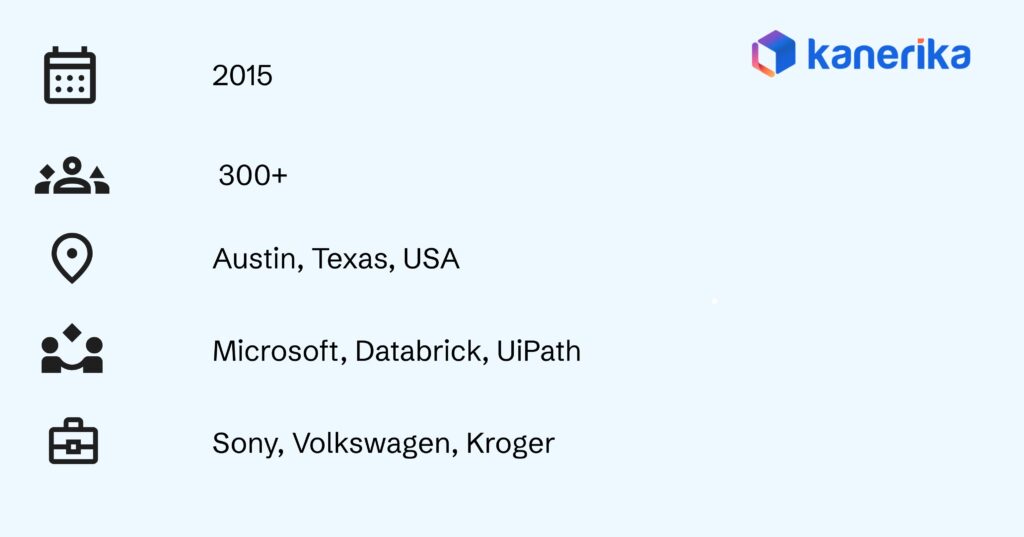
2. Accenture – Enterprise AI Consulting + Deployment
- Global reach and robust AI/ML capabilities for comprehensive automation solutions
- Strength: Large-scale digital transformation and multi-cloud expertise across different technology stacks
- Approach: End-to-end AI implementation from strategic planning through deployment and ongoing optimization
- Target market: Large enterprises with complex infrastructure requirements
- Use Cases: AI-driven insurance claims processing system reducing claim resolution time by 60%
- Multiple AI agents assess damage from photos, cross-reference policy details
- Automated fraud detection and approval for straightforward claims
- Intelligent escalation of complex cases to human adjusters
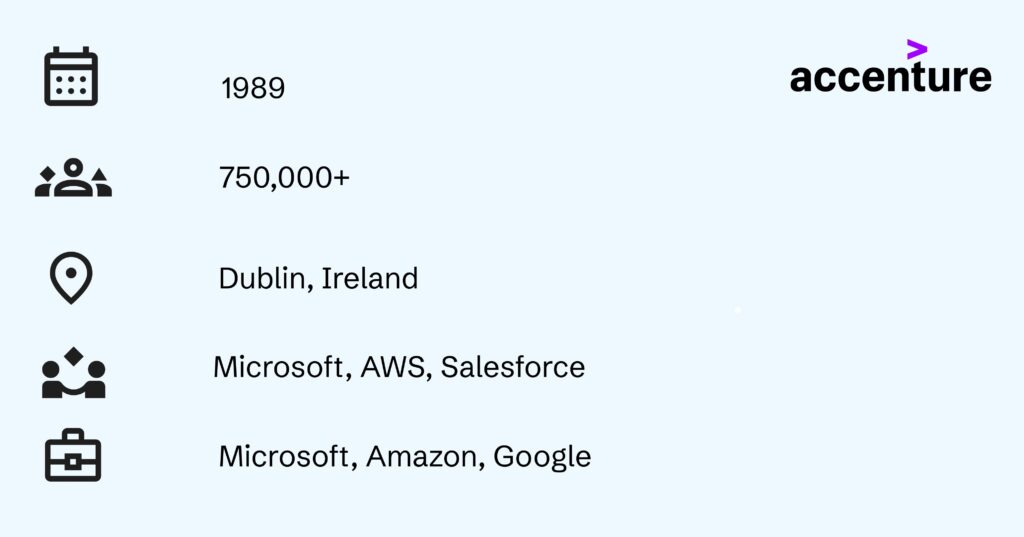
3. IBM – Watson-Powered Enterprise AI Agents
- Watson platform transformed into comprehensive suite for building enterprise AI agents
- Strength: Decades of enterprise software experience combined with cutting-edge AI capabilities
- Focus: Regulated industries where trust and explainability are paramount
- Approach: Hybrid cloud deployment and responsible AI practices with strict data governance
- Key platforms: Watson Assistant and Discovery for conversational and analytical AI agents
- Use Cases: Multi-agent banking system handling customer inquiries and loan applications
- Integration with core banking systems and full audit trails
- Explainable decision-making processes meeting financial regulations
- Personalized financial advice with regulatory compliance
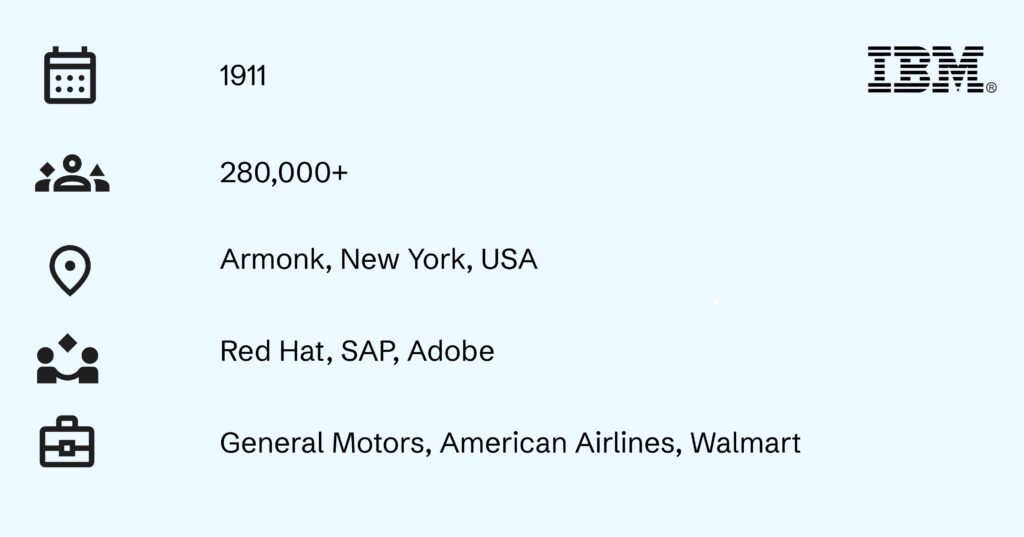
4. Cognizant – Process Automation & AI Agents
- Specialty focus: Banking, financial services, insurance (BFSI), and healthcare sectors
- Strength: Deep understanding of industry-specific workflows and regulatory requirements
- Approach: Combines business process expertise with advanced AI capabilities
- Value proposition: Vertical specialization delivering targeted solutions over generalist approaches
- Use Cases: Conversational AI agents for patient engagement in healthcare
- Appointment scheduling, medication reminders, and symptom assessment
- Electronic health records integration with HIPAA compliance
- 24/7 patient support and care plan coordination
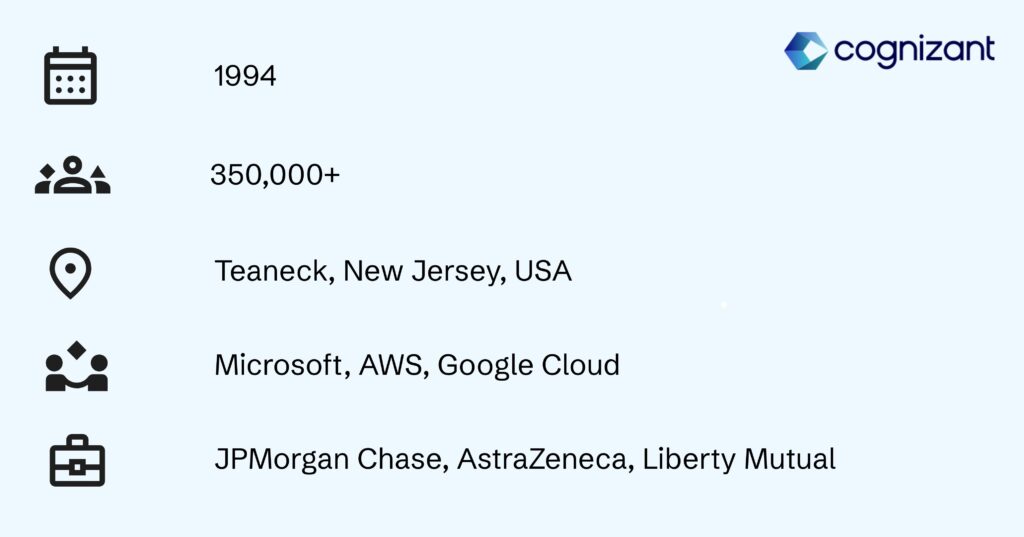
5. Infosys Nia – AI + Automation Platform
- Geographic advantage: India-based leader offering cost-effective solutions
- Platform focus: Nia as comprehensive solution for enterprise AI and automation
- Strength: IT operations and enterprise automation with agent-driven approaches
- Approach: Combines traditional robotic process automation with intelligent AI agents
- Target market: Organizations modernizing IT infrastructure and operations
- Use Cases: Agent-driven IT operations automation for global technology company
- System performance monitoring with predictive outage prevention
- Automatic resolution of common issues with intelligent escalation
- Detailed context and recommended solutions for complex problems
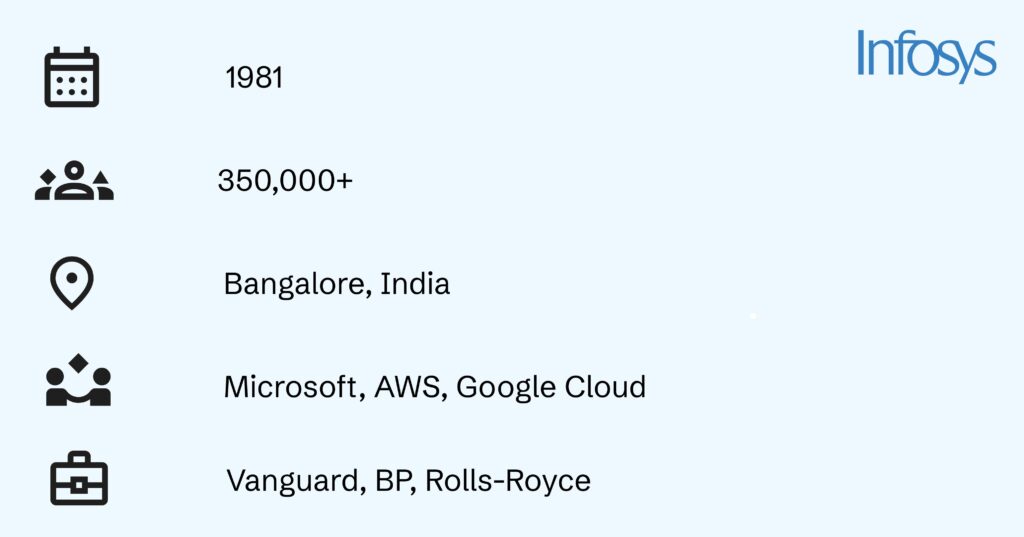
6. Microsoft – Copilot & AI Agent Ecosystem
- Focus: Enterprise productivity AI agents across Microsoft 365, Azure, and Dynamics
- Strength: Seamless integration into workplace tools used by billions worldwide
- Approach: Embedding AI copilots into daily workflows with strong governance and compliance
- Value proposition: Democratization of AI agents through Microsoft’s global reach
- Use Cases: AI copilots for office productivity
- Automated meeting scheduling and summarization
- Excel and Power BI analysis with natural language queries
- Enterprise-grade security and compliance for regulated industries

7. Google Cloud – Gemini AI Agents
- Focus: Multi-modal AI agents powered by Gemini models
- Strength: Strong capabilities in search, data, and AI research
- Approach: Embedding Gemini AI into Google Workspace, Cloud, and industry solutions
- Value proposition: Scalable, cloud-first AI agents leveraging Google’s global infrastructure
- Use Cases: AI agents for retail and customer experience
- Personalized product recommendations in e-commerce
- AI-driven demand forecasting in supply chains
- Customer service chatbots with multilingual support

8. Amazon Web Services (AWS) – Bedrock & Agent Frameworks
- Focus: Cloud-native AI agents through Amazon Bedrock and SageMaker integration
- Strength: Scalability, cost flexibility, and integration with AWS services
- Approach: Enabling enterprises to build and deploy custom AI agents rapidly
- Value proposition: Full ecosystem from data pipelines to AI agent orchestration
- Use Cases: AI agents in e-commerce and logistics
- Smart inventory management
- Automated product categorization
- Personalized shopping assistants for large-scale retail

9. Deloitte – AI Transformation & Intelligent Agents
- Focus: Enterprise consulting and AI-enabled business process redesign
- Strength: Advisory expertise combined with technology partnerships (Google, AWS, Microsoft, SAP)
- Approach: Aligning AI agent adoption with strategic transformation initiatives
- Value proposition: Industry-specific AI solutions backed by deep consulting expertise
- Use Cases: AI agents for financial services
- Automated compliance monitoring and fraud detection
- Customer service assistants handling 70% of queries
- Workflow optimization for large-scale operations
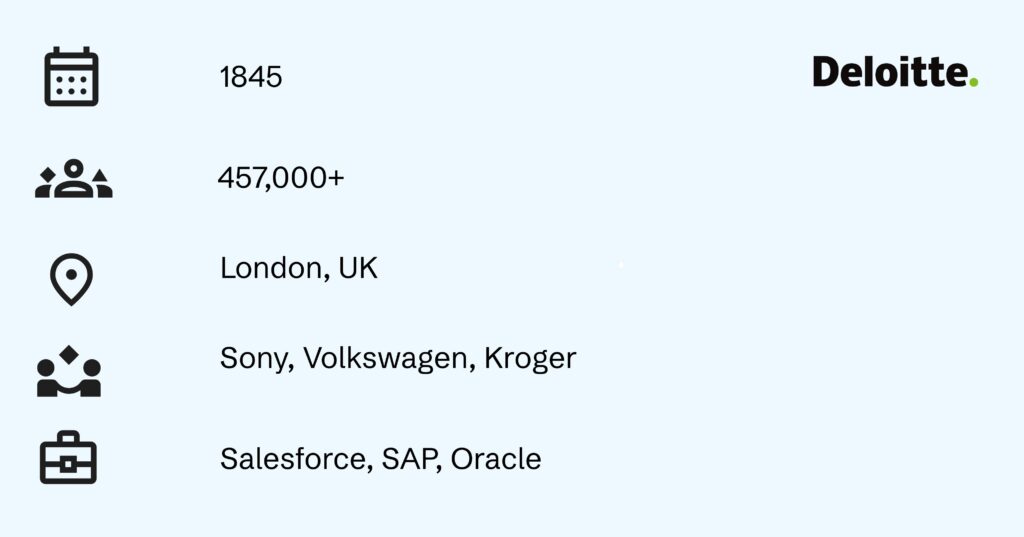
10. Tata Consultancy Services (TCS) – AI Agents & Automation at Scale
- Focus: Large-scale AI + automation deployments across industries
- Strength: Global delivery model and industry-specific AI expertise
- Approach: Leveraging ignio™ and AI-powered platforms for enterprise automation
- Value proposition: Cost efficiency, scale, and domain knowledge in BFSI, retail, telecom, and manufacturing
- Use Cases: AI agents for IT operations and business workflows
- Automated monitoring and predictive issue resolution
- AI-driven HR and payroll assistance
- Smart agents for telecom network optimization
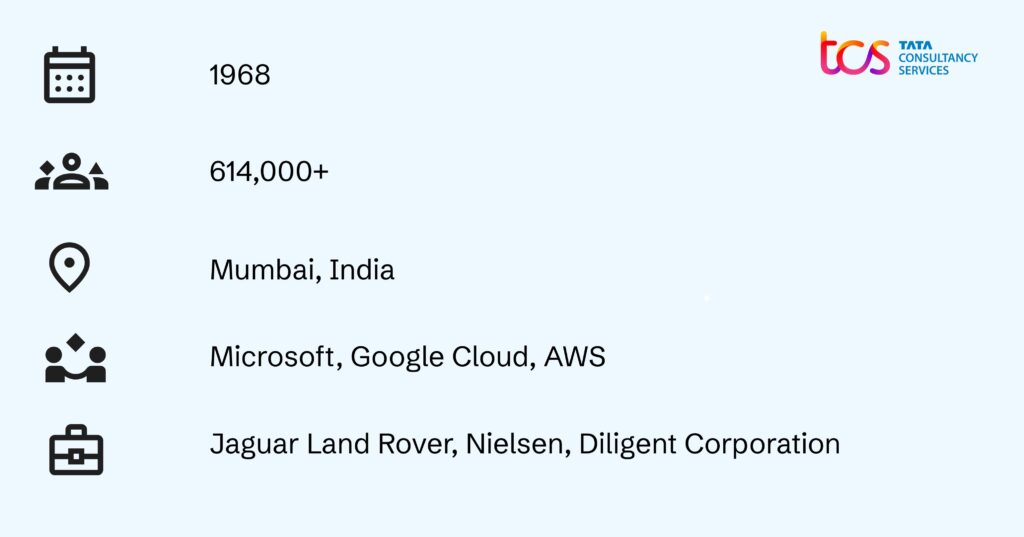
Top AI Agent Development Companies in 2025
| Company | Focus Area | Strength | Approach |
| Kanerika | Data-driven AI agent development | Microsoft & Databricks partner; expertise in multi-agent workflows | Solutions that become smarter over time through continuous data processing |
| Accenture | Enterprise AI consulting + deployment | Large-scale digital transformation & multi-cloud expertise | End-to-end AI implementation from strategy to optimization |
| IBM | Watson-powered enterprise AI agents | Decades of enterprise software + cutting-edge AI | Hybrid cloud deployment & responsible AI with strict governance |
| Cognizant | Process automation & AI agents | BFSI & healthcare domain expertise | Combines business process knowledge with AI |
| Infosys Nia | AI + automation platform | IT operations & enterprise automation | Blends RPA with intelligent AI agents |
| Microsoft | Copilot & AI agent ecosystem | Seamless integration into MS 365, Azure, Dynamics | Embedding AI copilots into workplace with compliance |
| Google Cloud | Gemini AI agents | Multi-modal AI & strong data/AI research | Embedding Gemini into Workspace & Cloud |
| Amazon Web Services (AWS) | Bedrock & agent frameworks | Scalability, cost flexibility, deep AWS service integration | Cloud-native AI agent deployment |
| Deloitte | AI transformation & intelligent agents | Industry-specific consulting + tech partnerships | Aligning AI adoption with transformation goals |
| Tata Consultancy Services (TCS) | AI agents & automation at scale | Global delivery + domain expertise | Leverages ignio™ platform & large-scale AI |
11. Startups & Innovators
The startup ecosystem continues to drive innovation in AI agent development, with several categories of companies pushing the boundaries of what’s possible:
Crewai-based Startups – Agentic Workflow Automation
Revolutionary platforms enabling multiple AI agents to collaborate on complex tasks
- Focus: Building systems where agents have specialized roles and coordinate activities
- Approach: Team-like collaboration models for achieving business objectives
- Value: Human-like teamwork dynamics in automated processes
AutoGen-driven Companies – R&D-Focused AI Labs
Cutting-edge AI research and development for sophisticated multi-agent systems
- Capabilities: Complex reasoning, collaborative problem-solving approaches
- Approach: Agents that debate different solutions and arrive at optimal outcomes
- Innovation: Advanced multi-agent coordination and decision-making
LangChain Consultancies – Rapid Prototyping of LLM Apps
- Specialty: Quick prototyping and deployment of large language model applications
- Value proposition: Enable businesses to rapidly experiment with conversational AI solutions
- Strength: Agility and focus on emerging technologies
- Target market: Organizations wanting to quickly test and implement new AI capabilities
Industries Benefiting from AI Agent Development Companies
1. Healthcare
- Patient triage systems analyze symptoms and medical history to prioritize urgent cases
- Clinical workflow automation handles appointment scheduling and insurance verification
- Medical record management updates patient information automatically
- Allows doctors and nurses to spend more time with patients instead of paperwork
2. Financial Services
Similarly, the finance industry leverages smart automation for critical operations:
- Fraud detection systems spot suspicious transactions and unusual spending patterns
- Automated financial advisors provide investment recommendations based on individual goals
- Portfolio management adjusts investments automatically based on market conditions
- Risk assessment evaluates loan applications and insurance claims faster than manual review
3. Retail & E-commerce
Meanwhile, retail businesses use intelligent assistants to enhance shopping experiences:
- Personalized shopping helpers suggest products based on browsing history and preferences
- Inventory management tracks stock levels and predicts when to reorder items
- Customer support agents answer questions about products, shipping, and returns
- Price optimization adjusts pricing based on demand and competitor analysis
4. Manufacturing
On the production side, manufacturers benefit from operational automation:
- Supply chain agents monitor inventory and coordinate with suppliers automatically
- Predictive maintenance systems schedule equipment repairs before breakdowns occur
- Quality control agents inspect products and identify defects during production
- Production planning optimizes manufacturing schedules based on demand forecasts
5. Customer Service
Finally, customer service operations use coordinated agent systems:
- Multi-agent contact centers route inquiries to specialized agents for different topics
- 24/7 support availability handles basic questions and escalates complex issues to humans
- Conversation memory remembers previous interactions across phone, chat, and email
- Issue resolution tracking follows up on problems until they’re completely solved

How to Choose the Right AI Agent Development Company
Evaluation Criteria
1. Domain Expertise
- Industry knowledge specific to your sector (healthcare, finance, manufacturing)
- Technical skills in building systems where multiple smart assistants work together
- Understanding of business processes and how automation can improve daily operations
- Experience with similar projects that match what you’re trying to accomplish
2. Proven Track Record Next, examine their history of successful projects:
- Client reviews and examples from companies similar to yours
- Working systems currently running in real business environments
- Long-term relationships showing ongoing support and system improvements
- Project variety demonstrating ability to handle different challenges and company sizes
3. Integration Capability Additionally, consider how well they connect with your current systems:
- Works with existing software including customer databases and business applications
- Easy data connections for smooth information flow between new and old systems
- Cloud platform experience matching your setup (Amazon, Microsoft, Google)
- Legacy system compatibility without requiring complete technology replacement
4. Security and Compliance Support Furthermore, ensure they meet regulatory requirements:
- Regulatory knowledge in data protection laws and industry-specific rules
- Security measures including data encryption and user access controls
- Data handling capabilities ensuring proper management of sensitive information
- Ongoing compliance as laws change and business needs evolve
Build vs Buy vs Partner Model
1. Build Internally: Best for companies with strong technical teams and unique needs that standard solutions cannot address. Requires significant time investment and ongoing maintenance costs.
2. Buy Ready-Made Solutions: Suitable for standard use cases with limited customization needs. Faster setup but may not fit specific business processes perfectly.
3. Partner with Development Company: Meanwhile, this approach works best for most organizations seeking customized solutions without internal development overhead. Combines expertise with tailored implementation.
CTO and CIO Checklist for 2025
1. Technical Assessment:
- Does the vendor work with your current technology and future plans?
- Can they show successful connections with your specific systems?
- What monitoring and maintenance support do they provide after launch?
2. Business Alignment: Do they understand your industry challenges and regulatory environment?
- Can they provide clear return on investment projections and success measures?
- What is their approach to change management and user training?
3. Strategic Partnership: Finally, consider the long-term relationship:
- Will they grow with your organization and adapt to changing needs?
- Do they offer training and knowledge transfer to your internal teams?
- What is their long-term product development and support commitment?
Get Data-Driven Answers in Seconds – Let Karl Turn Your Questions into Real-Time Insights
Partner with Kanerika Today.
Challenges & Risks in Partnering with Smart Automation Development Companies
Key Risks to Consider
1. Data Privacy & Compliance Risks
- Sharing sensitive business information with external partners creates potential vulnerabilities in data protection
- Companies may struggle to maintain control over how their data is stored, processed, and accessed
- Furthermore, different privacy regulations across regions can complicate compliance efforts
- Global development teams may operate under different regulatory frameworks
- Risk of data breaches or unauthorized access during development processes
2. Vendor Lock-in with Proprietary Systems
- Many development companies build solutions using their own specialized tools and frameworks
- This dependency makes it difficult to switch providers later and can increase long-term costs
- Moreover, proprietary systems may not integrate well with future technology choices
- Limited flexibility in making changes or improvements without original vendor
- Potential difficulties in finding alternative support or maintenance providers
3. Internal Change Management Challenges
- Implementing new automated systems requires significant organizational adaptation
- Employees may resist changes to familiar workflows and established processes
- Additionally, managers struggle to adapt existing procedures and performance metrics
- Training staff to work effectively with new systems often takes longer than planned
- Cost overruns frequently occur due to underestimated change management requirements
Effective Mitigation Strategies
1. Multi-Cloud Strategy
- Avoid dependency on single technology platforms by working with versatile partners
- Choose partners who support multiple cloud providers for greater flexibility
- Consequently, you maintain more control over technology choices and vendor negotiations
- Reduces risk of being locked into one vendor’s ecosystem or pricing structure
- Provides backup options if primary cloud provider experiences issues
2. Open-Source Framework Preference
- Choose development partners who primarily use open-source tools and industry standards
- These approaches ensure greater transparency and community support
- Furthermore, open-source solutions offer better long-term cost control
- Easier transitions between different service providers when needed
- Reduced vendor dependency and more competitive pricing options
3. Start with Pilot Projects
- Begin partnerships with small, limited-scope projects to evaluate working relationships
- Test solution quality and development processes before making larger commitments
- Moreover, successful pilots provide valuable learning experiences for larger implementations
- Helps identify potential issues early while building internal confidence
- Allows gradual scaling based on proven results and organizational readiness
Taking these precautions helps organizations maximize the benefits of external partnerships while maintaining control over their technology strategy and business operations.
Agentic Automation: The Future Of AI-Driven Business Efficiency
Explore how agentic automation is driving next-level business efficiency by enabling AI systems to act, decide, and execute with minimal human effort.
Future of AI Agent Development Companies
1. Next Frontier: Autonomous Multi-Agent Enterprises
Emerging Business Models:
- Fully automated businesses where smart assistants handle most daily operations without human oversight
- Self-managing systems that coordinate inventory, customer service, and financial planning independently
- Intelligent decision networks connecting multiple specialized assistants across different departments
- Autonomous problem-solving teams that identify issues and implement solutions automatically
Companies are moving toward systems where groups of smart assistants work together like digital employees, each handling specific tasks while coordinating seamlessly.
2. Role of Content Creation + Assistant Coordination
Integrated Capabilities:
- Smart content generation combined with task management creates powerful business automation
- Dynamic workflow creation where assistants can build and modify their own processes
- Real-time adaptation to changing business conditions without manual programming
- Intelligent resource allocation optimizing human and digital workforce collaboration
Furthermore, these combined technologies enable businesses to respond to market changes instantly while maintaining quality and consistency.
3. Evolution into Smart System Integrators
Industry Transformation:
- Traditional system integrators will evolve to specialize in connecting intelligent assistants
- New service models focusing on training and managing digital workforces
- Consulting services helping businesses redesign processes around autonomous systems
- Ongoing optimization ensuring smart assistants improve performance over time
4. Industry Projections for 2030
Research Findings:
- 33% of enterprise software will include smart assistants by 2028, enabling 15% of daily work decisions to be made autonomously
- 80% of common customer service issues will be resolved automatically by 2029
- 50% of supply chain management solutions will use intelligent agents by 2030
- 70% of business applications will use multiple smart assistants working together by 2028
Kanerika’s AI Agents: Meet Alan, Susan, and Mike
Alan – The Legal Document Summarizer
Alan is designed to streamline legal workflows by transforming complex contracts and legal documents into concise, actionable summaries. Users can define simple, natural language rules to tailor outputs to specific requirements. Alan helps legal teams reduce review time, accelerate contract analysis, and enhance decision-making.
Susan – The PII Redactor
Susan addresses data privacy and compliance with precision. It detects and redacts personally identifiable information (PII) such as names, contact details, and ID numbers. By automating this critical task, Susan ensures documents are compliant with privacy regulations before sharing or storage, protecting sensitive data and organizational integrity.
Mike – The Proofreader
Mike focuses on accuracy and quality assurance. It validates numerical data, checks for arithmetic consistency, and identifies discrepancies across documents. Whether it’s reports, invoices, or proposals, Mike ensures that your documentation is reliable, professional, and error-free.
These AI agents are just the beginning of how we at Kanerika are leveraging generative AI to deliver tangible business value. We help organizations reduce manual effort, improve compliance, and drive operational efficiency—one intelligent solution at a time.
AI Agent Examples: From Simple Chatbots to Complex Autonomous Systems
Explore the evolution of AI agents, from simple chatbots to complex autonomous systems, and their growing impact.
Kanerika: Purpose-Built AI Agents for Smarter Workflows
Kanerika brings deep expertise in AI/ML and agentic AI to help businesses work smarter across industries like manufacturing, retail, finance, and healthcare. Our purpose-built AI agents and custom Gen AI models are designed to solve real problems—cutting down manual work, speeding up decision-making, and reducing operational costs.
From real-time data analysis and video intelligence to smart inventory control and sales forecasting, our solutions cover a wide range of needs. Businesses rely on our AI to retrieve information quickly, validate numerical data, track vendor performance, automate product pricing, and monitor security through smart surveillance.
We focus on building AI that fits seamlessly into your daily workflow—not the other way around. Whether you’re dealing with delays, rising costs, or slow data access, Kanerika’s agents are built to close those gaps.
If you’re looking to boost productivity and streamline operations, partner with Kanerika and take the next step toward practical, AI-powered efficiency.
Don’t Wait Days for Reports – Ask Karl and Get Instant, Visual Answers
Partner with Kanerika Today.
FAQs
1. What are AI agent development companies?
AI agent development companies specialize in building intelligent software agents that can automate tasks, analyze data, and support decision-making across industries.
2. Why are AI agents important for businesses in 2025?
AI agents reduce manual work, improve efficiency, and enable smarter decisions. In 2025, they are central to automation, customer support, data analysis, and IT operations.
3. Which are the top AI agent development companies in 2025?
Some of the top players include Microsoft, IBM, Accenture, Cognizant, Infosys, Deloitte, AWS, Google Cloud, TCS, and Kanerika for specialized solutions.
4. How do these companies differ from each other?
Each company has unique strengths—Microsoft focuses on copilots, IBM on explainable AI, Accenture on large-scale consulting, while Infosys and TCS lead in cost-effective IT automation.
5. What industries benefit most from AI agent development?
Industries like manufacturing, BFSI, healthcare, retail, telecom, and logistics are seeing the biggest benefits—ranging from predictive maintenance to personalized customer support.
6. How much does it cost to work with these companies?
Pricing varies: some follow subscription models (e.g., Dataiku-style for medium enterprises), while others like Databricks and AWS use usage-based pricing for large-scale workloads.
7. How should businesses choose the right AI agent development partner?
Companies should assess scalability, integration needs, industry expertise, governance, and ROI potential before selecting an AI agent development partner.





